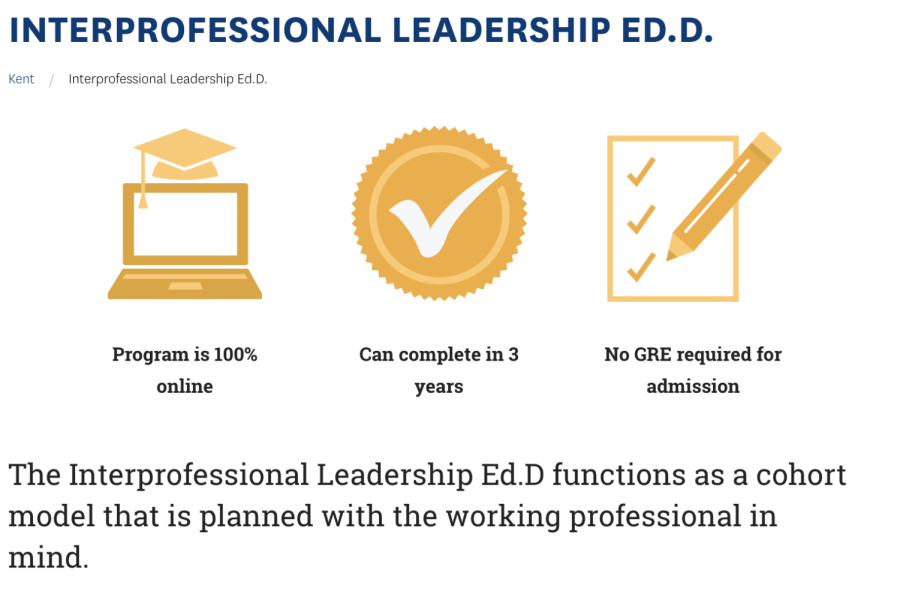New Interprofessional Leadership Ed.D. aims to spread global footprint of Kent State
November 17, 2019
Starting in the summer of 2020, graduate students in the College of Education, Health and Human Services will be able to receive a doctoral level degree, tending to practitioners who want to grow their leadership abilities.
According to Tricia Niesz, an associate professor of cultural foundations of education, Kent State’s new and 100 percent online Interprofessional Leadership Ed.D. is designed to serve as a practitioner’s doctorate for teachers rather than a researcher’s doctorate. A Ph.D. in education would prepare graduate students who want to go into research roles, while an Ed.D. in education will prepare those who are interested in educational leadership roles.
Niesz will go on to be the coordinator of the new Ed.D. in January of 2020, and will help oversee the first group of cohort students in summer 2020. The program is designed to take students three years to complete.
“I got very interested because my research is with educators,” Niesz said. “This program really is a good fit for educators who want to continue their education as leaders and that’s an area of interest of mine.”
The degree features five cognate areas: athletic training, educational technology, curriculum and instruction, cultural foundations and special education.
Steve Mitchell, the associate dean for EHHS, said practitioners from public schools, including teachers or administrators who want a terminal degree but don’t want to be researchers when they’re finished with schooling, will likely be attracted to the new Ed.D. program.
Kent State associate professor of educational technology Elena Novak is the program coordinator for the educational technology cognate. Novak said the program’s interdisciplinary approach of what it means to become a leader gives Kent’s program a unique edge.
“We do see Ed.D. programs in standalone fields,” Novak said. “For example, there may be an Ed.D. in educational technology only, or an Ed.D. in special education only. We hope that this interdisciplinary collaboration among different cognates will promote and foster interactions among our students, as they can certainly learn from each other.”
Previous leaders at Kent State played crucial roles in developing the new program. Mitchell said Catherine Hackney, previous associate dean for EHHS, and previous university president Beverly Warren deserve credit for encouraging administrators to continue forward with the Ed.D. over a six-year period.
Mitchell predicts the program could attract current Ph.D. students who feel this program is a better fit for their career goals.
“I’ve heard of interest and excitement actually even from one or two Ph.D. students who are thinking about switching into the Ed.D.,” Mitchell said. “They’re people who just started their Ph.D. programs who are thinking about moving to the Ed.D. because they like the practitioners’ emphasis, and so they find it quite attractive.”
Since the program is 100 percent online, Mitchell hopes global students are attracted to Kent’s new degree.
“Typically we get students from Ohio coming to our face-to-face programs … and realistically from Northeast Ohio. With a 100 percent online program, you expand the footprint of the university,” Mitchell said. “Our hope is that we might recruit some students from overseas into this program.”
When it comes to the size of the program, Mitchell said the program leaders have to decide how big they’ll allow the student group to reach.
“Our intention was to have it at about 25 to 30 students,” Mitchell said. “If we get a lot of applications, we may go beyond that.”
Niesz shared her program goals along with the desired outcomes that cohort students will likely experience.
“We want to educate them in using inquiry and research as ways to improve their own practice and improve their institutions,” Niesz said. “They’re going to be taking that holistic approach.”
Contact Linden Miller at [email protected].












